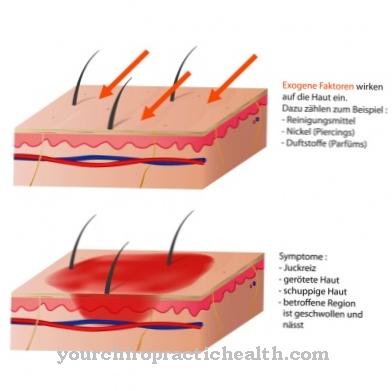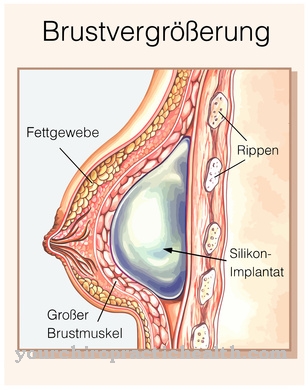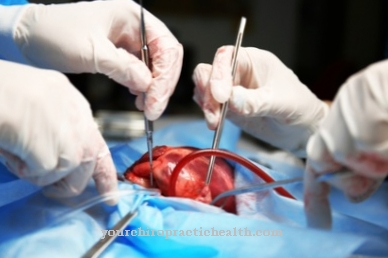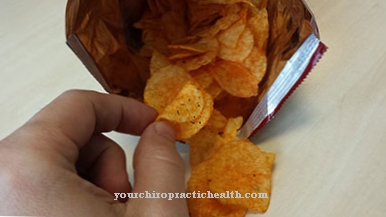Under Coprostasis is understood to mean the accumulation or accumulation of stool in the large intestine. It is therefore alternatively called stool accumulation or stool impaction. The English names are coprostasis or fecal impaction.
What is coprostasis?

© sebra - stock.adobe.com
Coprostasis is not actually a disease. Rather, as a symptom, it represents a serious digestive disorder and thus a serious health problem. The stool present in the rectum is not transported further in affected patients and primarily accumulates in the last area of the rectum, the rectum.
This is followed by constant dehydration of the stool, which causes the feces to thicken and solidify. The result is water-poor, hardened dung balls, also known medically as skybala. These bound balls of feces gradually close the intestines and cause the affected person to only partially empty his intestines.
If the ball of feces settles completely, similar to a plug, emptying the bowels is no longer possible, even under pressure. The dehydration of the intestinal contents continues and it comes to the formation of feces. These stone-like structures consist of massive and heavily thickened stools. They are surrounded by a layer of mucus and dried-on stool remains.
causes
Coprostasis usually develops from chronic constipation. The civilization disease constipation, commonly known as constipation, has a wide variety of causes. For the most part, a low-fiber, dry diet and a simultaneous lack of exercise (including bed rest and immobilization) are the triggers for indigestion. In addition, intestinal diseases such as abscesses, adhesions, hemorrhoids or even tumors can be the reason for constipation.
But also nerve diseases such as Parkinson's or multiple sclerosis, muscle diseases and hormone fluctuations during pregnancy are possible causes of constipation. Ultimately, even the side effects of drugs should not be underestimated. Among other things, antidepressants, opiates and anti-epileptic drugs repeatedly lead to unwanted constipation.
In older patients, coprostasis is often caused by insufficient fluid intake. In addition, with increasing age the rectal muscles relax and at the same time the intestinal peristalsis is often disturbed. Coprostasis can also arise from an acquired or congenital megacolon (enlargement of the large intestine) and after an intestinal obstruction.
You can find your medication here
➔ Medicines for constipation and intestinal problemsSymptoms, ailments & signs
Coprostasis is generally accompanied by severe pain in the lower abdomen. They usually occur on the right side and intensify as soon as a defecation reflex occurs. Especially in a sitting position, this defecation reflex, which runs into emptiness, leads to pains and pebbles. Those affected generally also complain of pronounced meteorism.
This accumulation of intestinal gases causes intense and therefore uncomfortable flatulence. On the other hand, nausea and vomiting associated with coprostasis occur less frequently. In connection with the pain on the right side, however, these are often the cause of confusion with appendicitis (appendicitis). An appropriate clarification with a specialist should be made.
Particular caution is required if a simulated diarrhea occurs, in which large intestinal secretions pass the stool to the outside. It can be followed by fecal incontinence, which means that it is no longer possible to hold back the stool or to empty the bowel voluntarily.
Diagnosis & course
A diagnosis can only be made through a specialist. In the best case, this person can feel the hardened ball of excrement and excrement stones through the exposed abdominal wall, which are hereinafter referred to as coprom or sterkorom. However, only an x-ray of the abdominal region provides a clear finding.
Complications
Significant complications can arise with coprostasis. The congestion of the faeces in the intestines creates the risk of an intestinal infection, and so-called peritonitis can also occur.Initially, however, there is diarrhea and nausea, often accompanied by constipation and other intestinal problems.
In the further course, an untreated coprostasis can cause an intestinal obstruction, which is often life-threatening for the patient. In less severe cases, coprostasis leads to urinary incontinence and later to fecal incontinence. In the advanced stage, coprostasis often leads to severe intoxication and infections in the intestines.
This initially leads to circulatory problems, later life-threatening organ disorders and other complications occur. These include, for example: Proctalgia, intestinal relocation and appendix rupture, depending on the underlying condition and the time of treatment. The accumulation of faeces also increases the risk of fecal stones, which prevent complete emptying of the intestines and thus favor a variety of gastrointestinal diseases such as infections and constipation.
If coprostasis is treated early, there are usually no long-term complications. Laxative preparations can lead to deficiency symptoms, dehydration and physical exhaustion in the short term, while surgical interventions carry the risk of injuries to the intestine.
When should you go to the doctor?
In the case of severe complaints in the lower abdomen, even if they occur on the right side, most people think of harmless symptoms that you may associate with a certain only temporary stool problem (constipation). But these complaints are usually not harmless abdominal pain and should therefore at least be discussed with a doctor, who can then determine any further examinations that may be required after an initial diagnosis. If the all-clear can then be given, there is at least a reassuring clarity.
If the pain occurs particularly when sitting or if a pronounced meteorism (accumulation of intestinal gases) is noticed, a specialist should be consulted immediately so that a differentiated diagnosis can be made on the basis of special intestinal examinations. The intense flatulence, which often occurs in parallel, underlines the urgency of a medical consultation.
As with appendicitis (appendicitis), right-sided pelvic problems can lead to vomiting and nausea. An exact differentiation between coprostasis and appendicitis must be made by a specialist immediately.
If large intestinal secretions leak or if stool incontinence occurs, it is imperative that you see a doctor.
Treatment & Therapy
The treatment of coprostasis should also be left to the specialist. Self-therapy with laxatives or home remedies is not recommended for the most serious form of constipation, as this can result in an intestinal obstruction (medical ileus) as well as an intestinal infection, peritonitis and so-called autointoxication. Autointoxication is a state of intoxication that comes about through bacterial penetration.
Decomposition of the intestinal contents get into the bloodstream and cause fever, headache, fatigue and a weakening of the immune system. Elderly people, children and people with a weakened immune system in particular should seek help immediately in the event of coprostasis.
Treatment of coprostasis depends on the severity and condition of the patient. Mild cases are treated with enemas and controlled intake of laxatives. Oral administration of a PEG solution and subsequent orthograde colonic irrigation are common.
In more severe cases, stools are digitally cleared. Here, the fecal plug is removed manually by a specialist and then a cleaning enema is carried out. Stool clearance is usually painful for those affected. Surgical intervention and the use of painkillers are only used in exceptional cases.
In order to prevent the coprostasis from becoming chronic, the formation of new feces must be stopped after the bowel has been completely emptied and the stool consistency must be regulated. In this regard, chair training has proven effective for children.
Outlook & forecast
In most cases of coprostasis there is severe pain in the lower part of the abdomen. The pain is usually increased when you sit. In addition to the pain, intestinal gases also accumulate in the patient, which can lead to unpleasant feelings of pressure in the stomach and unpleasant odors.
Coprostasis can be diagnosed relatively easily by a doctor with the help of an X-ray. The doctor can also feel for the presence of the ball of feces with his hand. If the symptom is not treated, a life-threatening bowel obstruction can result. In the worst case, this can also lead to incontinence. In addition, there are numerous infections and inflammations in the intestine, which lead to severe pain.
In most cases, treatment is medication. If this is started early, there will be no further complaints or complications. Only in severe cases is an operation necessary, during which the intestine is cleaned. However, coprostasis can occur again after the treatment and is therefore not completely excluded.
You can find your medication here
➔ Medicines for constipation and intestinal problemsprevention
Otherwise, adequate hydration and a high-fiber diet with grains, vegetables, and legumes are among the most common preventive measures. Active exercise and weight reduction if you are overweight also promote bowel activity.
If you are susceptible to constipation and coprostasis, light colon irrigation is recommended. They loosen hardened areas and keep the intestinal walls supple. As a precaution, children and patients with circulatory problems should speak to their family doctor or specialist before use. Long-term use of laxatives is strongly discouraged. Despite seeming success, laxatives can promote coprostasis.
Aftercare
With coprostasis, there are usually very few or no special follow-up measures available to those affected. First and foremost, the disease must be recognized and treated very quickly. The reason for the coprostasis should of course also be avoided, although the disease can have various causes.
Therefore, causal treatment must also be in place so that the disease can be completely cured. Most of those affected depend on the use of laxatives. It is important to ensure that the dosage is correct so that there is no poisoning. However, if the symptoms do not subside with the conservative methods, a doctor must be consulted again to prevent a complete blockage of the intestine.
In some cases, surgery is necessary to relieve the symptoms. Bed rest must be observed in any case after such an operation. Only light food should be consumed in order not to strain the intestines. The diet can then return to normal over time. Coprostasis can possibly lead to a reduced life expectancy of the person concerned.
You can do that yourself
There are good self-treatment options against the accumulation of faeces in the colon. Basically, however, it should be noted that the therapy should be carried out under the supervision of a specialist. The uncontrolled use of household pills and laxatives can lead to more serious illnesses such as a blockage or infection of the intestine, peritonitis or poisoning by invading bacteria.
People suffering from coprostasis should increase their intake of liquid foods and foods rich in fiber, such as grains, vegetables and legumes. Laxative foods such as sauerkraut, pineapple and sour milk are also recommended. In acute cases, it helps to drink plenty of water. Taking a tablespoon of olive oil before breakfast also significantly increases the gliding ability of hard stools.
A lot of exercise keeps the intestines active, strengthens the rectal muscles and prevents the formation of balls or pillars of faeces. Daily abdominal massages are also an option, as this improves the shape, position and tension of the digestive system muscles. If you are susceptible to coprostasis, regular light colon irrigation is recommended. This loosens hardened areas and keeps the intestinal walls supple. Under no circumstances should laxatives be used permanently. These preparations often cause short-term relief, but increase coprostasis in the long term. Under certain circumstances, these agents even cause stool build-up in the first place.


.jpg)
.jpg)









.jpg)

.jpg)
.jpg)











.jpg)